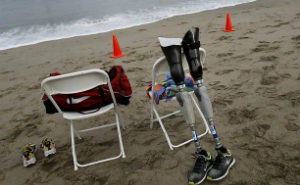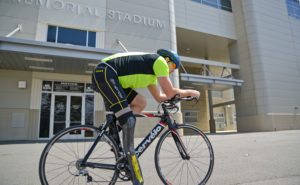Every parent wants the best for their child and wishes to see them develop in a positive way. However, certain unique challenges arise when it comes to supporting children who have limb differences. Playing sports, going to school, and even walking around with friends can require serious mental and physical adjustment. Some children never fully regain their confidence after losing or severely damaging a limb. But, at Horton’s Orthotics and Prosthetics, we aim to change that.
We specialize in the custom fabrication of artificial limbs and braces for children. Each piece is individualized to match the needs of the child and ensure they can do anything they set their minds to. Every child deserves the opportunity to grow without physical limitations, and our pediatric orthotics and prosthetic services will provide them that opportunity.
Understanding the Journey
As if growing up wasn’t hard enough, children who have lost limbs can experience even more challenges in this process. Every parent hopes for a seamless transition between being fully able-bodied to having an artificial limb, but the reality is that it will be challenging for both the parents and the child. Because of this, it is important to stay realistic and informed in order to give your child the best support, whether it be physical or emotional.
Stay Informed
Hopefully, parents and children have a chance to prepare for their body change; however, that isn’t always an option. So, whether they are able to spend substantial time researching and preparing or it happens overnight, parents should still research limb differences. This might include reading blogs, joining pediatric orthotics and prosthetics groups online, or maybe even setting up meetings with a therapist who specializes in limb differences.
The prosthetist working with your child will have a wealth of information about anything from pediatric prosthetic limb care to how to emotionally support a child with limb differences. And, at Horton’s Orthotics and Prosthetics, we pride ourselves on embracing the most sophisticated new technologies, which can provide a better quality of life for your child. We will always give parents the opportunity to learn about the latest advances and how those might affect their children.
Stay Optimistic
While there may be a number of overwhelming emotions being felt all round, it is important for your and your child’s mental and physical health that you stay optimistic. These days, society is very good at enabling people with physical differences (such as artificial or missing limbs) to dwell on their difficulties. However, it is best to find ways you can positively adjust your home to support your child with their transition.
Focus less on the friends that might tease them and more on the new friends they will make through support groups. And, you can make friends, as well; you should strive to meet other parents who have been through what you’re currently experiencing. They will give you hope that life will become normal again. It might not be the same normal as before, but it will still be a new reality that you can become happy and comfortable with and one in which your child will learn to thrive.
Stay Connected
Limb difference can bring with it a radical life change. So, we recommend you find positive support for yourself as well as your child. Support groups are a fantastic place to start, because you’ll meet people who can help you through the healing process and give you hope for the future. We recommend groups such as Amputee Coalition and the Association of Children’s Prosthetic-Orthotic Clinics. These organizations are designed to educate the public about and support families who have experienced limb differences. They can connect families with other groups nearby or provide options for pediatric prosthetists.
In addition to staying connected to these organizations and groups, parents should also stay connected to their friends and family. Parents can only give so much. It’s important that the caregiver for a child also takes care of themselves. This might include talking to a medical professional, getting a massage, or even just spending some quality time with friends for an hour every week.
Stay Accessible
Once a child goes back to their daily activities, it’s important that their parents be accessible. They should talk with any childcare workers, like the child’s teacher or daycare attendant, and explain how they can best support the child. After all, these individuals will be among the first who need to know how to handle particular care needs or difficult situations. That being said, parents should also direct caregivers to not put a spotlight on the child. If they are not allowed to do a group activity or are given preferential treatment, it is more likely to create a divide between the child and his or her classmates. Instead, they should be treated normally and with equal respect to that of their peers.
It’s also important for the parents of children with limb differences to stay accessible in case any others have questions about how to support the child. If the parents do not make themselves available, a friend, family member, or parent of another child may inadvertently say or do something that has a negative impact.
Communicating with the people around you will help foster respectful, supportive relationships, and it will help to offer these people a better understanding of your child’s needs. Moreover, if you are more open about limb differences, you are much more likely to teach your child how to be more comfortable around other people.
Now What?
Children grow so quickly. Because of this, it is vitally important to have a prosthetist who is committed to creating quality pediatric prosthetics and orthotics that can change and adapt for every age. This can make the difference in offering children with limb differences a chance to live just as fully as those without them.
At Horton’s Orthotics and Prosthetics, our passion lies in helping people flourish and providing them with the tools they need to live their lives to the fullest. Our staff is dedicated to providing the absolute best care and support for individuals and families of people with limb differences.
If you are ready to start the journey with us, or if you simply want to find out more, give us a call at 501-214-4191, or request an appointment today. At Horton’s, we’re here for you.



